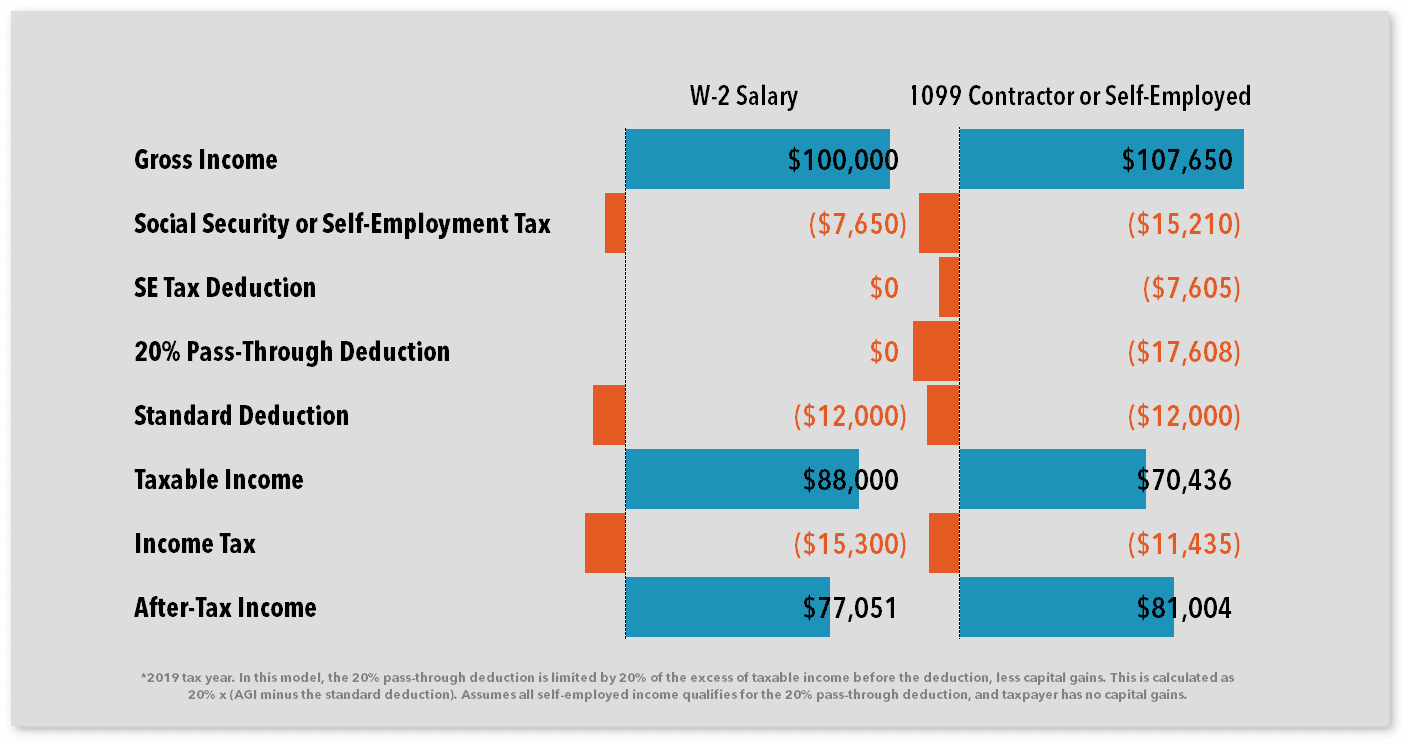
See Quick Summary Here
1099 vs. w2 employee, the differences between an independent contractor and employees
Difference between w2 vs. 1099 and why it matters; identifying these employees is essential to today’s employee pool in small businesses, companies, offices, or firms. The cost of wages, benefits, and taxes can be expensive. Employers nationwide have to pay FICA or Social Security and Medicare, and payroll tax where you, the employer, foots 50% of the tax, not to mention unemployment tax and workman’s comp.
No wonder employers look to escape this heavy load, employing what they call a “1099 employee”. Which, by the way, is not an IRS, nor legal term) Intentional or not, doing this can leave the employer, companies, or firms in a situation where back employment taxes could be due and late penalties assessed.
So, you do not make this mistake; let us review some of the fundamental distinctions and how to determine whether to hire w2 vs 1099 employees, let’s walk through the 1099 contractor vs. w2 pros & cons.
1099 vs w2, which is better for employees 2021 (chart)
Here’s what it looks like for an individual who earns $100,000 as an employee or the equivalent of $107,650 as a 1099 contractor:

In this scenario, that’s a net difference of $3,954 in extra take-home pay for the 1099 employee, relative to $100k in wages, due to a 20% pass-through deduction. This is a massive tax benefit just for being an independent contractor!
Basics Definition For W2 Employees
It is not always cut and dry when verifying the difference between these two groups. But if you train your staff, you guide them in their tasks, set clear hours, and decide how to complete the job. These are more likely to be listed by the IRS as W2 workers.
When we think of a salaried worker, we generally consider a W2 employee. Unlike independent contractors, W2 employees do not own their own companies. They work for your company, participate in employee benefit programs, and follow your company’s needs and schedule. Unless there is a compelling reason to classify a worker as an independent contractor, the default classification is W2.
According to the law, employees must be paid at least the federal and state minimum wage for time performed on a regular and continuous basis. Employers pay employer payroll taxes and withhold Social Security and Medicare taxes from W2 employees. Employees can typically be fired for poor performance or any other reason, nondiscriminatory reason. On the other hand, an independent contractor works and is paid according to the terms of a signed agreement between the parties. They’re also in charge of their taxes.
W2 employees are given the necessary equipment and resources by their employers. Contractors that work alone are responsible for their supplies. Furthermore, employees are generally reimbursed for business expenses spent while on the job. This isn’t generally the case with independent contractors unless it’s specified explicitly in their contract.
Benefits such as health insurance, retirement contributions, and flexible spending accounts are available to all qualifying employees at a firm. As previously noted, benefits are not available to independent contractors who work for a firm.
Basics Definition For 1099 Employees
A 1099 employee, often known as an independent contractor, provides specific services as specified in a written contract. While some 1099 employees focus on a single project at a time, many others serve many clients and provide a service in their field. Freelancers and consultants are examples of self-employed and hence company-owned independent contractors.
W2 employees are frequently employed to work with them indefinitely. On the other hand, businesses engage independent contractors for a certain period and according to the contract’s terms and conditions. On the other hand, the engagement can be renewed as often as the 1099 employee, and the business owner see appropriate.
Regardless of the length of their contract, independent contractors choose how and where they work, as well as the equipment and methods they use to do the task you hired them to undertake. Employees employed on a 1099 basis can hire their own employees to help them deliver the product or service you hired them to provide. To put it another way, independent contractors are in charge of their own work.
You have minimal financial and legal responsibility since you have limited control over independent contractors. If you hire an independent contractor, you won’t have to pay payroll taxes since 1099 employees pay employee and employer self-employment taxes. 1099 workers aren’t entitled to the same benefits as you because they operate their businesses.
Basic’s When Working With An Independent Contractor (How Does A 1099 Work)
By comparison, if the worker sets his hours. Decide how and when to do the work, which may mean they’re an independent contractor.
If you hire a contractor, have them fill out the W9. Contractors should complete a 1099 form called Form W-9. This 1099 form provides you with their correct Taxpayer Identification Number (TIN) so that you can report how much you pay for them.
Is My Job Misclassified?
You’re not alone; many jobs have been misclassified between contractor and employee. The Treasury Department reports in 2018 that companies nationally misclassify millions of employees as independent contractors instead of employees, thereby avoiding having to pay payroll tax (employment tax).
We spoke to Danny Nordstrom, an Accountant with 20-plus years of experience, to better understand the two designations’ implications.
Nordstrom says, “Just violating one of the rules probably won’t boot you into the other category. When you breach enough of them, you are likely to be reclassified as an employee of W-2.”
If you feel like your customer is exerting too much influence over your workflow to be considered a contractor properly, Nordstrom says it’s necessary to act.
While you might not feel comfortable bringing it up, he states, “if the state does a 1099 audit and determines that you are an employee, the company is at risk of penalties and fines.”
Nordstrom advises reaching out to both the HR department of your client and the boss doing your task.
“Explain that you have given up control over your workflow and receive nothing in return, such as benefits,” Nordstrom says.
Precision Global Consulting, out of Austin, Texas, has this to say about the “factor that determines whether a hire is a contractor or W-2 employee.”
In general, the business will have two options: either they will have to release power and increase your flexibility over your job and schedule, or they will have to reclassify you as an employee and begin supplying you with employee benefits, instruments, and facilities.
If You Are Audited
When it comes down to doing so, 1099 employees save a lot of money for businesses. Because of the higher cost of holding workers, many employers having to shift from independent contractors to workers may find the transition difficult due to the hit to the bottom line. Because incorrectly categorizes employees these employee types, the IRS has cracked down on companies misclassifying their employees as contractors.
Many government departments, including the IRS, will eventually take the decision should it be put forward for review. The IRS must weigh other factors when determining whether you are an employee or an independent contractor.
The IRS may, and often does, take action against employers who misclassify 1099 workers, including ordering the employer to pay all back employment taxes plus an additional penalty.
Finally, the worker himself may file suit, looking for back pay for overtime, payroll tax, and employee benefits. Misclassifying 1099 workers as independent contractors can be an expensive mistake for a business.
Considerations for Employers
By using independent contractors instead of employees, company owners can avoid income tax withholdings, employment taxes, accountability for employee acts, federal and state discrimination laws that only apply to employees, and the requirement to offer benefits.
While this may appear too good for some organizations, there are some practical disadvantages to hiring 1099 staff. For example, independent contractors understand that they have the freedom to choose whether or not to come to work without fear of losing their jobs. They can work their hours and complete tasks on their terms as long as the job is completed and fulfills the employer’s criteria.
1099 contractor vs w2- 20 Point Checklist
We have a checklist to help you walk through this process to avoid this issue. When you have a checklist and program, make sure it stays up-to-date.
Naturally, as in all tax-related matters, there are unique laws, exceptions, and regulations covering any possible scenario. For more details, please get in touch with AccuServe Payroll if you have concerns about hiring a certain type of worker and are not sure about classification or other tax or payroll issues.
*This checklist does not constitute legal advice. The checklist is only the opinion of the writer and not legal advice. Please seek legal advice from a competent lawyer to advise you on this subject’s differences
AccuServe Payroll disavows any responsibility or warranty for the information on these state payroll pages. The material provided is for informational purposes only and does not constitute tax or legal advice. Verify this information with professional tax, legal, or other experts to see if and how it applies to your circumstances.
This website provides articles that are intended to be informative and educational. AccuServe Payroll is not responsible for the accuracy of any information provided on these pages. AccuServe Payroll does not necessarily agree with or support any of the views stated in the materials. The information contained in these documents should not be construed as legal or accounting advice, nor should it be used to replace legal, accounting, or other professional advice where the facts and circumstances justify it. Suppose you need legal or accounting advice or professional assistance to address your specific facts, circumstances, and business needs. In that case, you should consult a licensed attorney, accountant, or other tax specialists.






